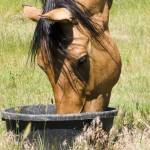Feeding to Prevent Gut Pathology in Horses

Horses have a specialized digestive system based on their natural feeding pattern of continuous ingestion of grass and other forage. Variations to this pattern can easily lead to gastrointestinal upsets that can have serious consequences. Problems are more often due to poor feeding management rather than feed itself. The following points are important in keeping a horse’s digestive system functioning smoothly.
1. Horsemen should be educated by feed producers, nutritionists, and veterinarians to realize that horses were not designed to eat large meals of readily fermentable carbohydrate, and must ensure adequate fiber intake, which more closely mimics the horse’s evolutionary adaption to eating. More frequent and smaller meals almost always decrease feeding-related problems.
2. Within reason, regularity of feeding is crucial.
3. Feed to maintain hindgut function, maximizing the contribution of forage and reducing carbohydrate overload of the cecum.
4. Eliminate the possibility of bad feed. Proper storage of feed is crucial to the prevention of mold, rancidity, and loss of feed quality.
5. Feed by weight, not volume. The bulk densities of feeds vary significantly, and feeding “by the scoop” is not appropriate.
6. Encourage adequate exercise and prevent all classes of horses from becoming too fat.
7. With the help of a veterinarian, maintain functional dentition and routinely deworm.
8. Immunization for botulism may be considered, especially when feeding midgrade forage. Starting with a healthy horse aids in allowing maximum feed utilization and decreased feed usage.








